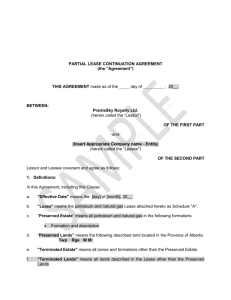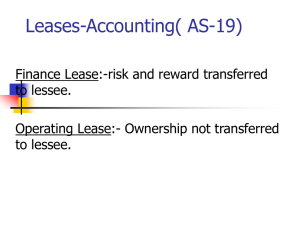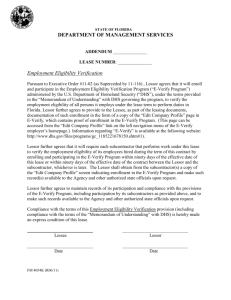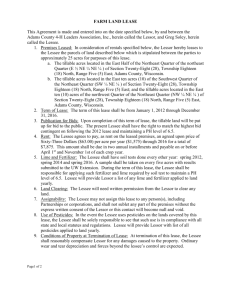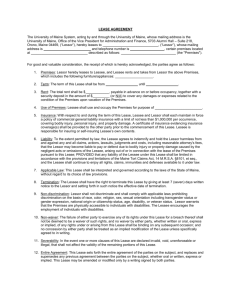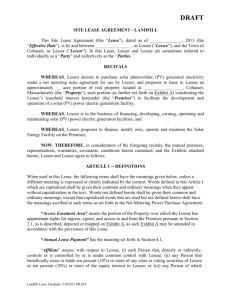2. Lessee – Maintenance Deposits, 2008
advertisement
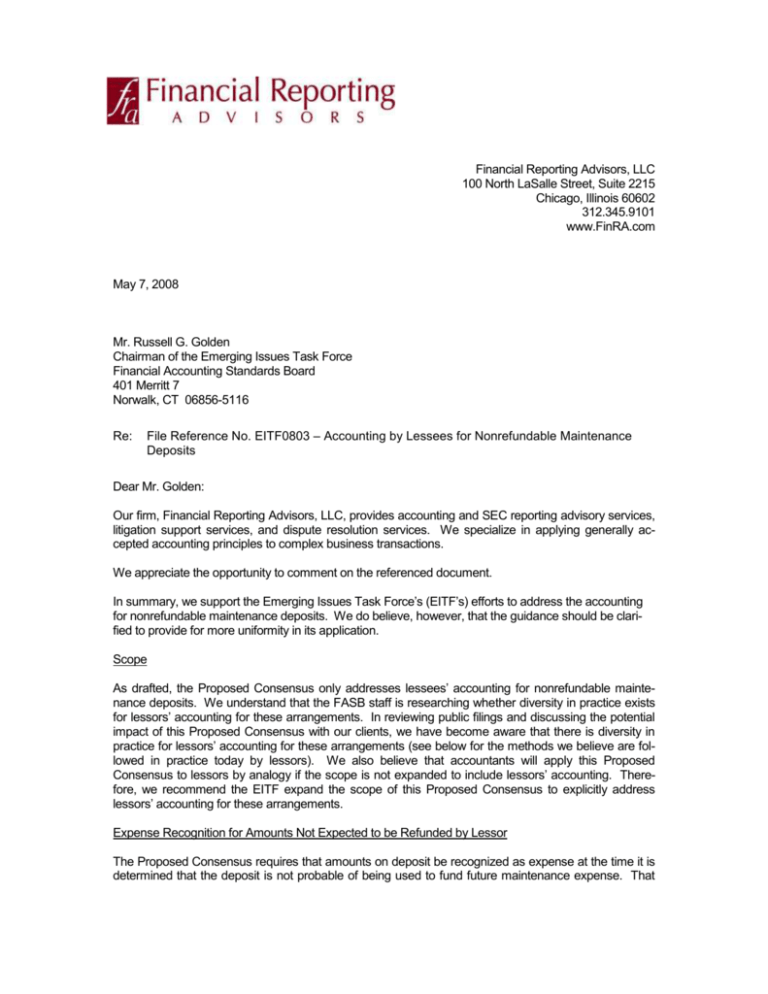
Financial Reporting Advisors, LLC 100 North LaSalle Street, Suite 2215 Chicago, Illinois 60602 312.345.9101 www.FinRA.com May 7, 2008 Mr. Russell G. Golden Chairman of the Emerging Issues Task Force Financial Accounting Standards Board 401 Merritt 7 Norwalk, CT 06856-5116 Re: File Reference No. EITF0803 – Accounting by Lessees for Nonrefundable Maintenance Deposits Dear Mr. Golden: Our firm, Financial Reporting Advisors, LLC, provides accounting and SEC reporting advisory services, litigation support services, and dispute resolution services. We specialize in applying generally accepted accounting principles to complex business transactions. We appreciate the opportunity to comment on the referenced document. In summary, we support the Emerging Issues Task Force’s (EITF’s) efforts to address the accounting for nonrefundable maintenance deposits. We do believe, however, that the guidance should be clarified to provide for more uniformity in its application. Scope As drafted, the Proposed Consensus only addresses lessees’ accounting for nonrefundable maintenance deposits. We understand that the FASB staff is researching whether diversity in practice exists for lessors’ accounting for these arrangements. In reviewing public filings and discussing the potential impact of this Proposed Consensus with our clients, we have become aware that there is diversity in practice for lessors’ accounting for these arrangements (see below for the methods we believe are followed in practice today by lessors). We also believe that accountants will apply this Proposed Consensus to lessors by analogy if the scope is not expanded to include lessors’ accounting. Therefore, we recommend the EITF expand the scope of this Proposed Consensus to explicitly address lessors’ accounting for these arrangements. Expense Recognition for Amounts Not Expected to be Refunded by Lessor The Proposed Consensus requires that amounts on deposit be recognized as expense at the time it is determined that the deposit is not probable of being used to fund future maintenance expense. That Mr. Russell G. Golden May 7, 2008 Page 2 guidance appears to be based on an assumption that, at lease inception, the lessee expects all amounts paid to the lessor as maintenance deposits will be returned to the lessee over the term of the lease. Discussions with our clients indicate that such an assumption is not always appropriate. Assume the following simplified fact situation. ● Lease requires periodic fixed base rent payments. ● In addition to base rent, the lessee is obligated to pay $100 per hour of use of the leased asset at each periodic payment date as a maintenance deposit. Amounts deposited with lessor are refundable to the lessee only to the extent of eligible maintenance costs incurred by the lessee during the lease term. ● Lessee’s best estimate at lease inception is that it will have 1,000 hours of use of the leased asset during the lease term and that it will incur $60,000 of eligible maintenance costs during the term of the lease. The guidance in the Proposed Consensus appears to require the lessee to treat the amounts paid to the lessor for the first 600 hours of use as a deposit and then treat all deposit payments after the 600 hour mark as an expense when incurred. That accounting would “backend” the expense recognition of what appears to be a contingent rent payment that has been built into the maintenance deposit provision of the lease. We believe that, in the above fact situation, the lessee should bifurcate the $100 per hour payment between a maintenance deposit ($60 per hour) and a contingent rent payment ($40 per hour). In a situation in which the lessee’s best estimate is that the entire amount will be refunded over the term of the lease, the entire deposit payment would be recognized as a deposit asset. We believe such an approach is consistent with the guidance in FASB Statement No. 13, Accounting for Leases, for the separation of executory costs from lease payments. We also recommend that the consensus address the lessee’s accounting for any changes in estimates of the split that occur during the term of the lease. We note that changes in lease payments for operating leases are often recognized on a prospective basis. For example, a change in estimate of the amount of payment a lessee will be required to make at the end of the lease term in accordance with a residual value guarantee is recognized in expense on a prospective basis (see Question No. 12 of Issue No. 96-21, “Implementation Issues in Accounting for Leasing Transactions Involving SpecialPurpose Entities”) as is the additional lease expense caused by a income tax indemnity payment (see Issue No. 86-33, “Tax Indemnifications in Lease Agreements”). Timing of Expense Recognition for Amounts Not Expected to be Refunded by Lessor The Proposed Consensus uses the phrase “not probable of being used to fund future maintenance expense.” It is not clear whether that phrase means (1) less than probable the amount will be used to fund future maintenance expense or (2) probable the amount will not be used to fund future maintenance expense. If the EITF does not accept our prior recommendation and continues to use the language in the Proposed Consensus, we recommend that the final consensus clarify the intent of that phrase. Lessor Accounting for Arrangements Within the Scope of this Issue As indicated above, we believe the following accounting practices are used today by lessors with arrangements within the scope of this Proposed Consensus: Mr. Russell G. Golden May 7, 2008 Page 3 ● Treat all amounts received as a deposit liability until the deposit liability equals the amount of the expected maintenance expenditures for the term of the lease. Recognize amounts received in excess of the expected maintenance expenditures for the term of the lease as income when accruable (that is, recognize the excess in the same manner as contingent rent). ● Treat all amounts received as a deposit liability until all maintenance expenditures for the term of the lease have been incurred. Once all maintenance expenditures for the term of the lease have been incurred, recognize any remaining deposit liability as revenue. Amounts received subsequent to all maintenance expenditures for the term of the lease being incurred are recognized in income when accruable (that is, recognize the amounts received subsequent to all maintenance expenditures for the term of the lease being incurred in the same manner as contingent rent). ● Treat all amounts received as a deposit liability until the end of the term of the lease. At the end of the lease term, recognize nonrefundable amounts received in income. ● Prorate all payments received between (1) the amount expected to be returned to the lessee and (2) the amount expected to be retained by the lessor. Amounts expected to be returned to the lessee are recognized as a deposit liability and amounts expected to be retained by the lessor are recognized in income as accruable (that is, recognize in the same manner as contingent rent). Consistent with our recommendation above for the lessee’s accounting, we believe the better accounting for the lessor is to bifurcate the payment received between the amount expected to be returned to the lessee and the amount expected to be retained by the lessor (the last alternative listed above). However, we believe lessors need to have the ability to make a reasonable and reliable estimate of their split of the payment received in order to recognize revenue prior to the point in time when all maintenance expenditures for the term of the lease have been incurred. We suggest the final consensus list factors that would impair a lessor’s ability to a make a reasonable and reliable estimate, similar to the approach in paragraph 23 of EITF Issue No. 01-9, “Accounting for Consideration Given by a Vendor to a Customer (Including a Reseller of the Vendor’s Products).” We thank you for considering our views. We would be pleased to discuss our comments with the FASB staff, if that would be helpful. Very truly yours, Financial Reporting Advisors, LLC



